The best way to ensure wealth and prosperity in the New Year is to eat a bowl of tteokguk, aka dduk gook, 떡국 or Korean Rice Cake Soup on New Year's Day! This rich, brothy soup is a traditional New Year's dish, but it's also a cozy classic you can eat year round when you're craving those chewy little rice cakes. Shall we?
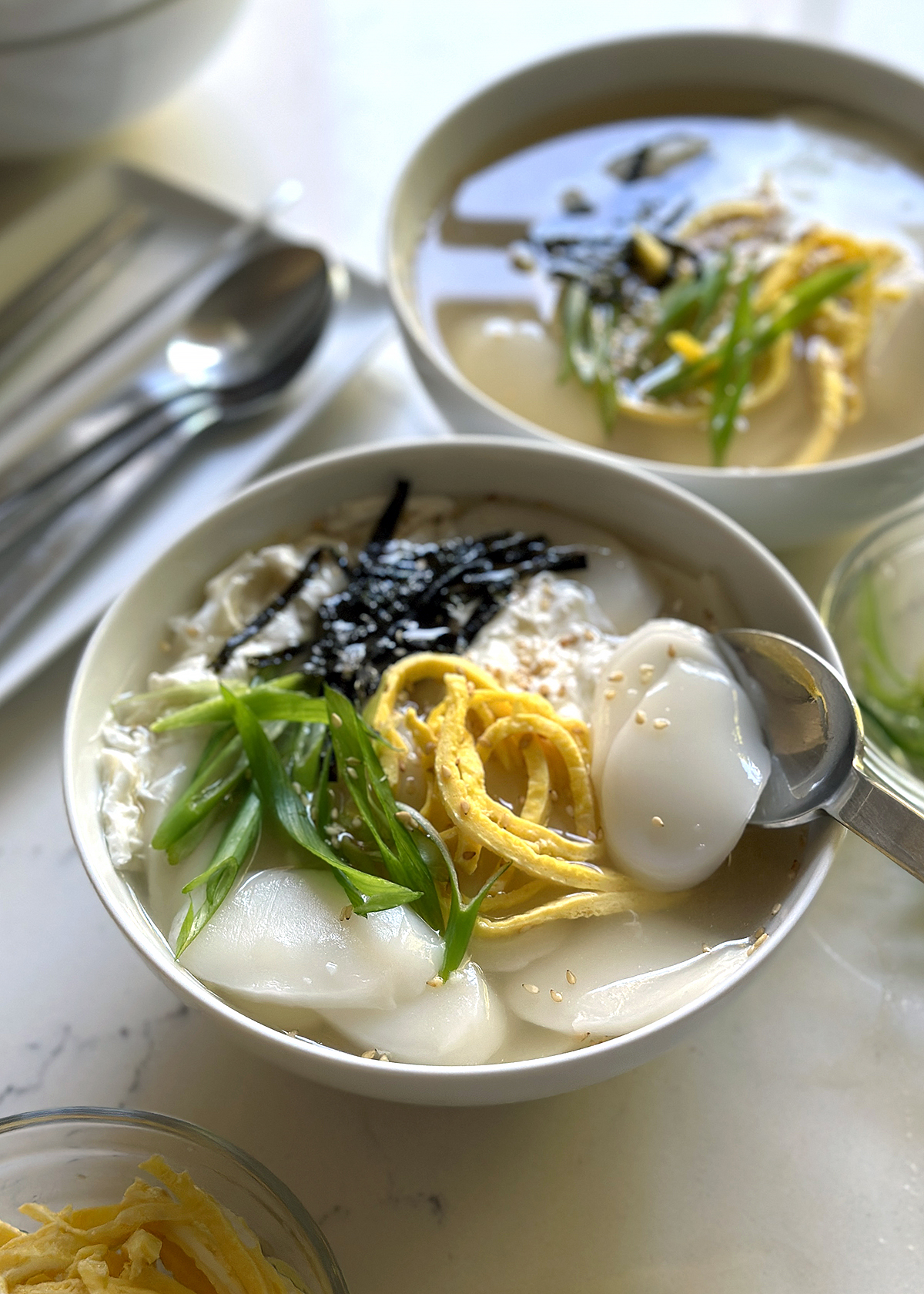
Jump to:
- What is Tteokguk?
- Ingredients You Need for Dduk Gook
- What Kind of Broth Do You Use for Tteokguk?
- Instructions for How to Make Tteokguk
- Tteokguk Variations
- Pro Tips and Techniques for Tteokguk
- Advance Prep, Leftovers, and Storage
- What Else to Serve with Tteokguk
- Traditional New Year Dishes
- Tteokguk, Dduk Guk | Korean Rice Cake Soup Recipe
What is Tteokguk?
Tteokguk, sometimes spelled dduk gook, is a classic Korean soup with a rich, soy-seasoned broth as the soup base and tteok, Korean rice cakes, as the main ingredient.
Originally, tteokguk was a meal eaten on the morning of seollal 설날, the Korean celebration of the Lunar New Year. These days Koreans also have tteokguk on Western New Year’s day, January 1st, too. The tradition is likely based on ancient religious symbolism that the when the old year passes, all things in heaven and earth are reborn and should be clean and white. The white color of the tteok and the clear soup base represents "brightness" or "purity." Tteok for this soup are flat, oval discs that look like coins, so they symbolize a wish for upcoming wealth and prosperity for anyone who eats them.
There is no hard and fast rule for the kind of broth used as the base for tteokguk. Historically, cooks made the broth from pheasant. Eventually, chicken replaced the pheasant, and today, you can simmer beef, chicken, fish, and even pork to make the broth base.
The star of the tteokguk is, of course, the chewy rice cakes called tteok. Tteok is a general term for a lot of different kinds of dumplings made from rice flour, but the kind used in this soup are the flat, oval shaped tteok.
Each bowl of tteokguk gets colorful garnishes, which vary by region and personal taste. Scallions, eggs, and gim 김 Korean seaweed are traditional garnishes, but basically anything else for modern diaspora versions, everything from julienned red Fresno chiles to pickled carrots to roasted shiitake mushrooms depending on the broth base and whatever you happen to find at the market.
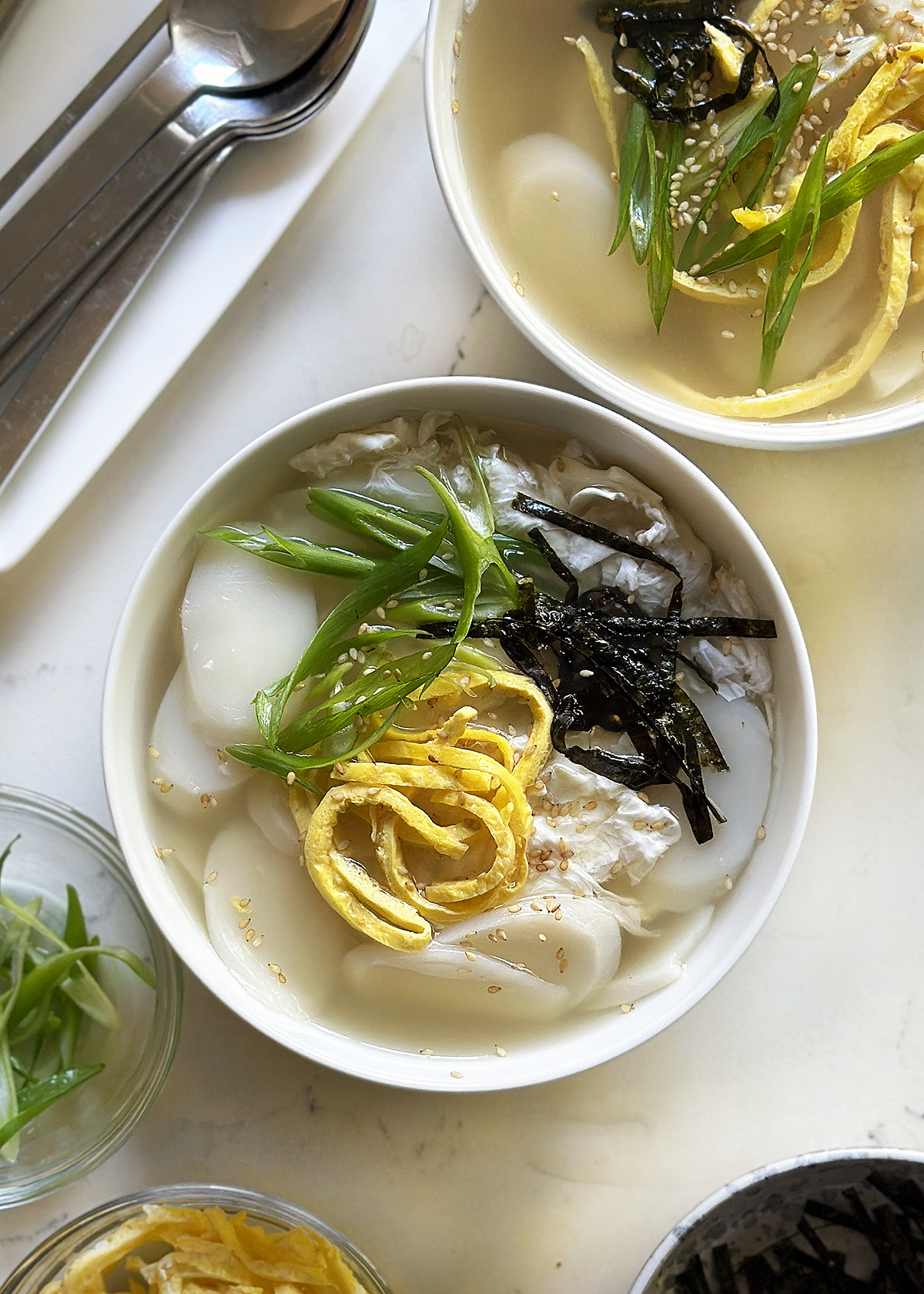
What is the Difference Between "Tteokguk" and "Dduk Guk?"
Tteokguk and Dduk Gook are different English spellings of the same Korean word 떡국.
Personally, I prefer "dduk gook" because that spelling reads more like the way word sounds out loud to me, but for some reason everyone now uses "tteokguk."
And if Costco calls it tteokguk and sells it, then I'm ok with that.
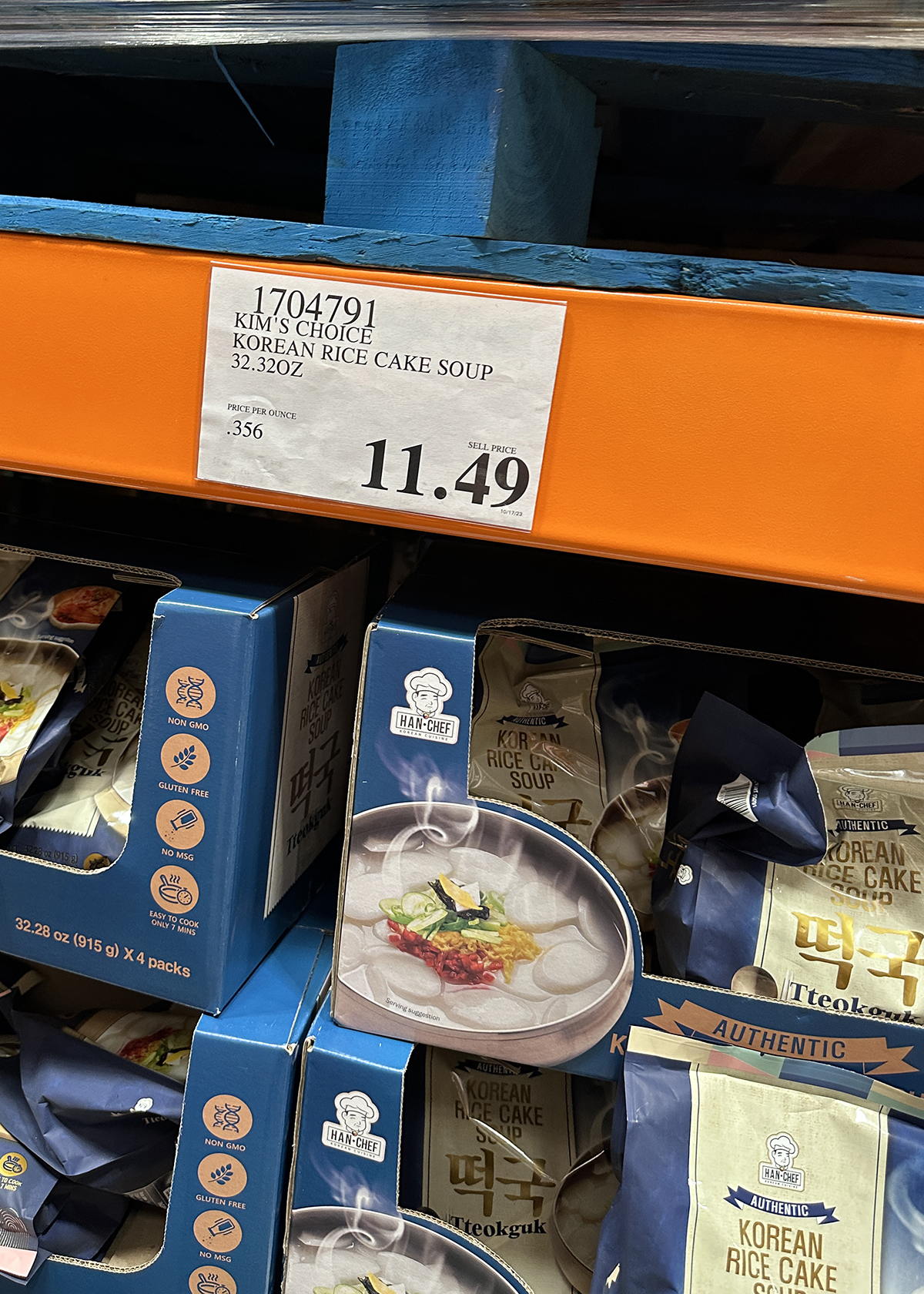
How to Pronounce "Tteokguk"
Don't think too hard by looking at the English letters, especially the "tt" or the "dd." In either case, it should sound like your tongue is stuck between saying "d" and "t."
Personally, I think "dduk gook" is a better translation of the Korean characters, because it literally sounds like "duck gook." But if you pronounce "tteokguk" the way you read it, it might come out as "tee-ock guck" and guess what, it's good enough that we know what you're trying to say.
By the way, I used to be super self-conscious about pronouncing ANY non-English word Spanish Korean and otherwise and that held me back a lot from learning about cultural cuisines. How stupid was that. Now I go around and do my best, learn, do my next best and keep learning. You should too.
Ingredients You Need for Dduk Gook
- Tteok or dduk, flat oval rice cakes
- Beef, chicken other protein, or leave meat out
- Broth
- Korean soup soy sauce called "guk gan jang"
- Garlic is it even a Korean recipe if it doesn't have tons of garlic?
- Green onions
- Eggs to make "jidan" 지단, a thin egg omelet sliced into long strips as garnish
- Nori seaweed, called "gim" 김 in Korean, for garnish
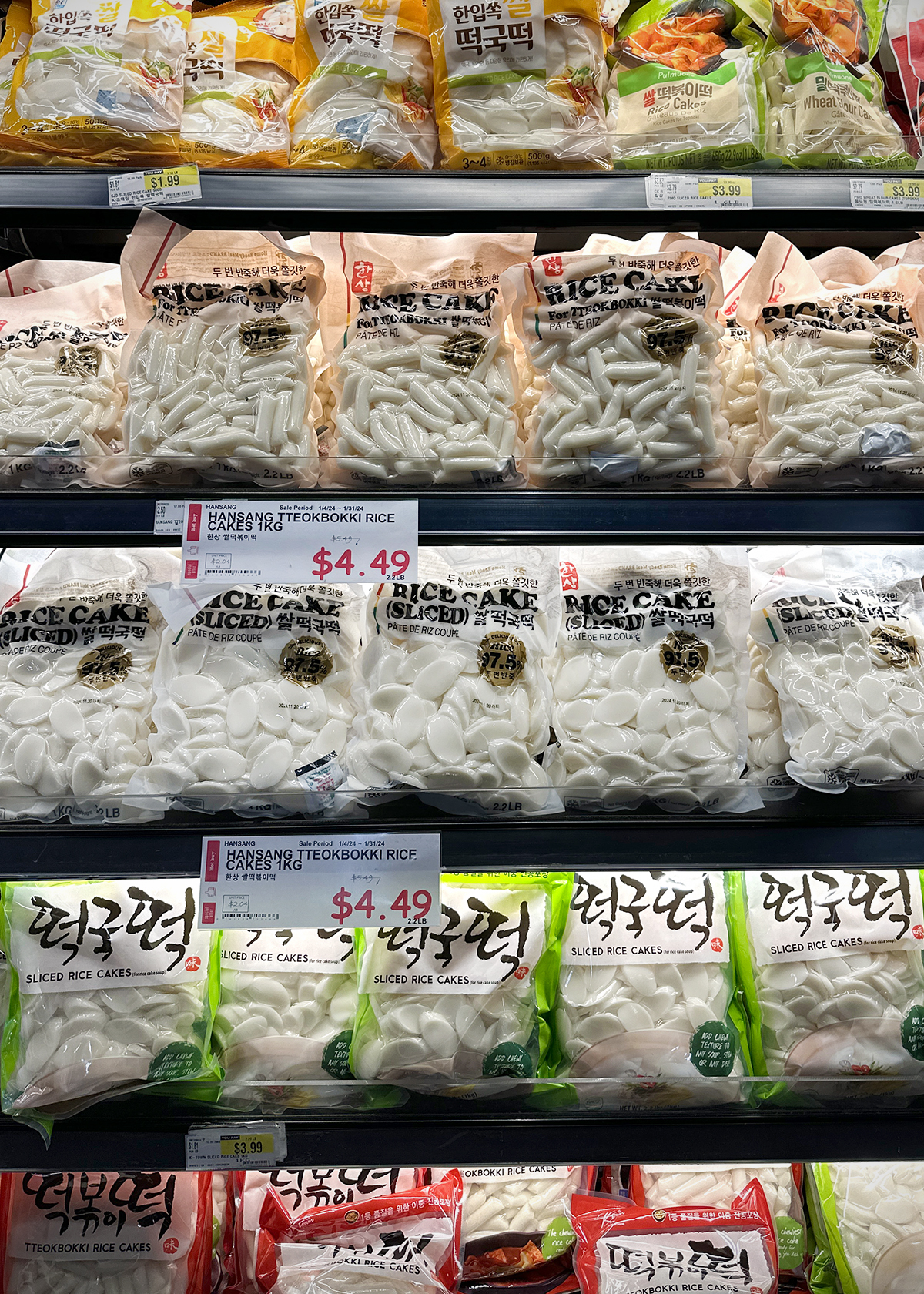
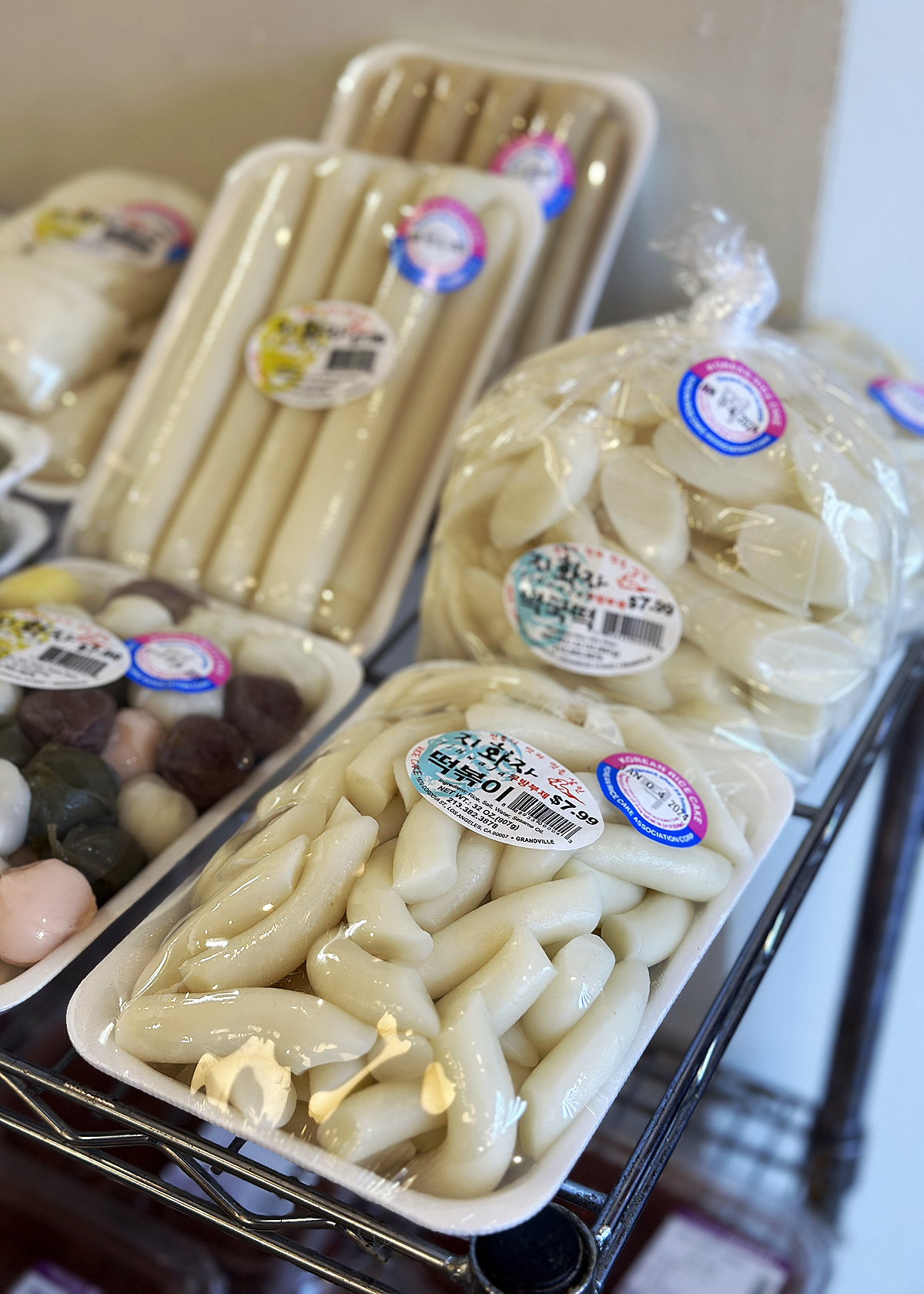
What is Tteok and What Kind Should I Use for Tteok Guk
What is Tteok?
The word “tteok" or "dduk” is generally translated to English as "rice cakes," but these aren’t what we know as styrofoam Quaker rice cakes for dieters. Tteok are more like dumplings or pasta, made from rice flour, and are similar to Japanese mochi.
There is a huge variety of tteok, made from different kinds of rice flours, different shapes, colors, flavored with other ingredients, and even formed into filled or stuffed dumplings. Some tteok are sweet, some are savory.
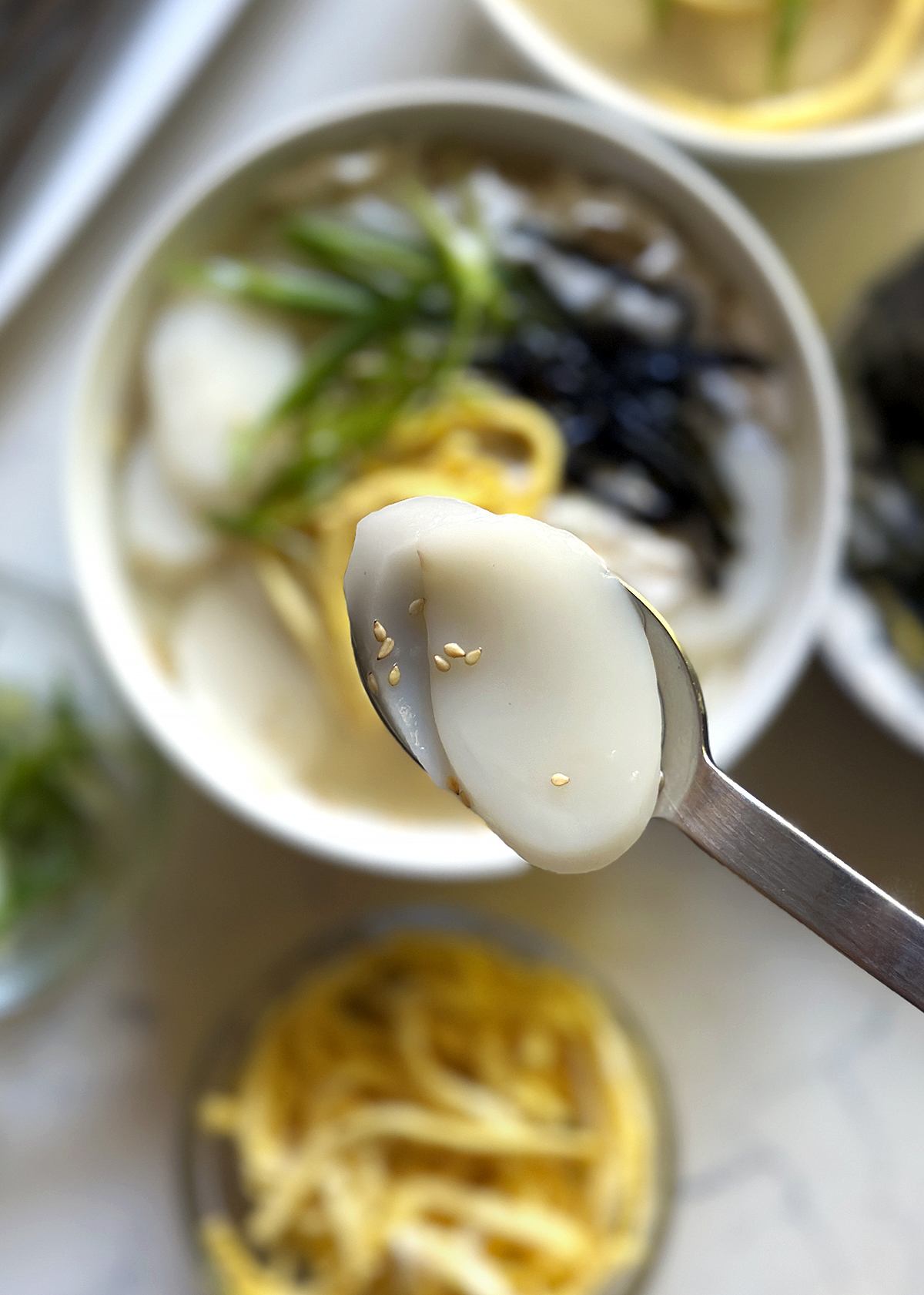
What Kind of Tteok for Tteokguk?
The tteok used for this tteokguk is called garaetteok, which are made from regular, short grain rice flour and shaped like long, super thick noodles. The garaetteok gets sliced on the bias into flat ovals, as pictured in the spoon above! The oval shape is symbolic for the new year because the tteok looks like bright shiny coins, representing wealth and prosperity.
You can buy garaetteok and slice it yourself, or just buy it already sliced. Korean markets sell tteok for tteokguk fresh in the refrigerator and frozen.
What Kind of Broth Do You Use for Tteokguk?
Every family has their own way of making tteokguk. Most people make it with either rich beef stock or light anchovy stock. Here are the options:
- Anchovy Stock, made with only dried anchovies, super clean color and flavor, or Anchovy Kelp Stock with kelp/kombu
- Beef Broth, super rich, and if you really want some health benefits, use beef bone broth
- Chicken Broth
- Mushroom Broth
You can make any of the broths or stocks from scratch! However, if you are at the Korean or Asian grocery store getting tteok, you can also pick up dried or prepared stocks! There are entire grocery aisles dedicated to broths, stocks, and other ingredients for making soup.
For our family, tteokguk has a rich chicken broth base that thickens slightly with the addition of the rice cakes. When I make tteokguk, I use my ultra nourishing homemade chicken bone broth.
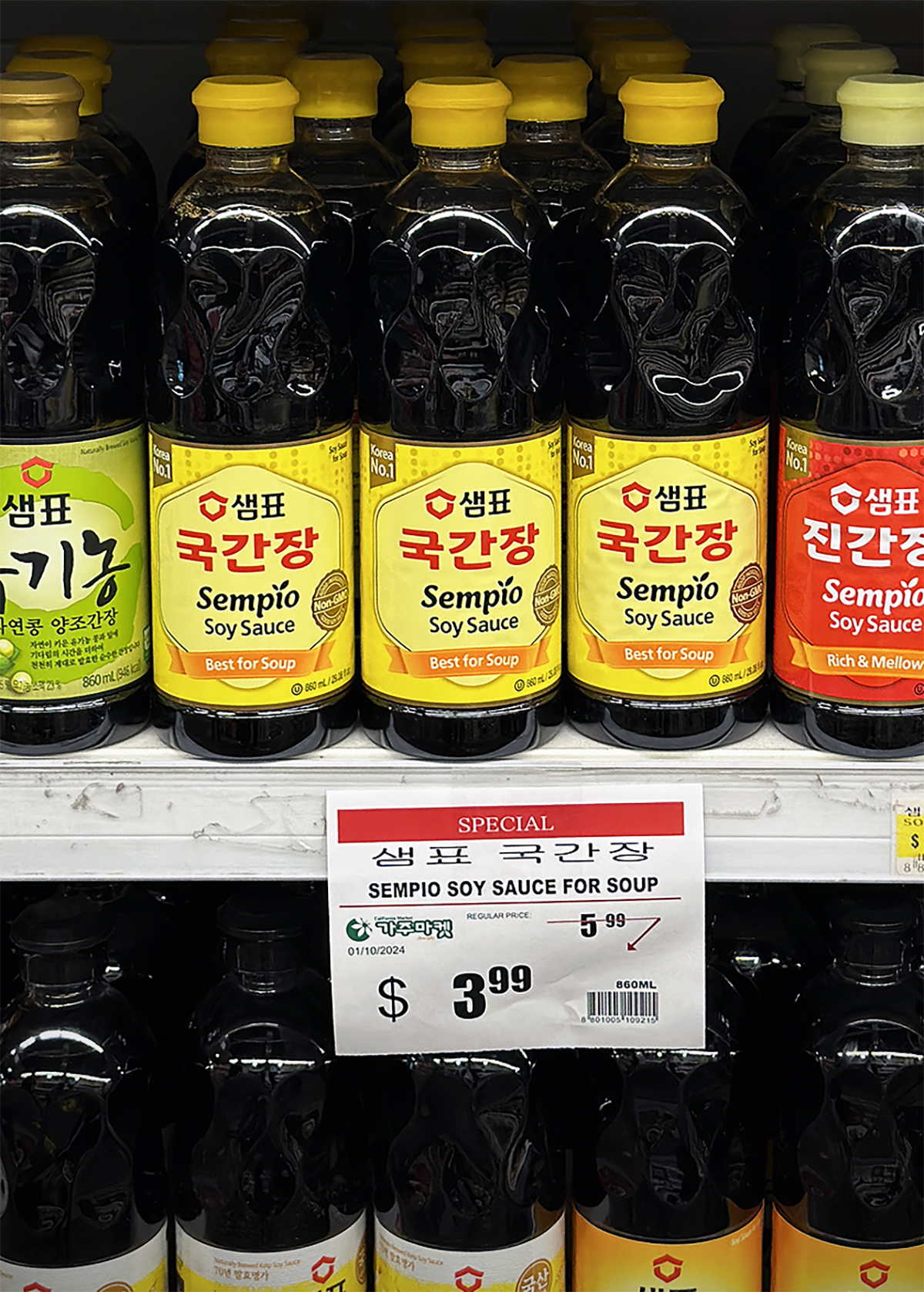
What is Guk Gan Jang aka Korean "Soup Soy Sauce?"
A whole separate soy sauce just for soups? Yes, guk gan jang!
Korean soup soy sauce 국간장, in English "guk gan jang" translates literally to "soup soy sauce." It is a type of soy based-sauce, though guk gan jang is made differently from regular soy sauce and thus tastes different. It is lighter in color, with a deeper umami. You will find guk gan jang in the same aisle as soy sauce, just look for "soup soy sauce" or "soy sauce for soup" as in the photo above, and read the ingredients to make sure there's no added grains or sugars. Amazon also sells different guk gan jangs. This one online is a great brand, made from non-gmo soybeans and has no added ingredients. The one I have is from HMart.
Additional Ingredients Notes and Resources
- Garlic. The real ones know that if you go to a large Korean grocery store, you can find jars of fairly recently pressed fresh garlic, which is a huge timesaver if you use a lot of garlic regularly. Otherwise, mice fresh garlic yourself.
- Nori. I use plain Korean seaweed, gim, lightly toast it in a pan, then cut into super thin strips. You can also just open one the small plastic packages of pre-toasted and salted squares and just crush them up with your hands into each bowl.
- All other fresh herbs and produce from either the Santa Monica Farmers' Market on Wednesday, or Whole Foods Market when I can't find what I need at the farmers' market.
Instructions for How to Make Tteokguk
Tteokguk is fairly straight-forward to make. The one key is timing the addition of the tteok to the broth just before serving so that the tteok doesn't break down too much in the soup!
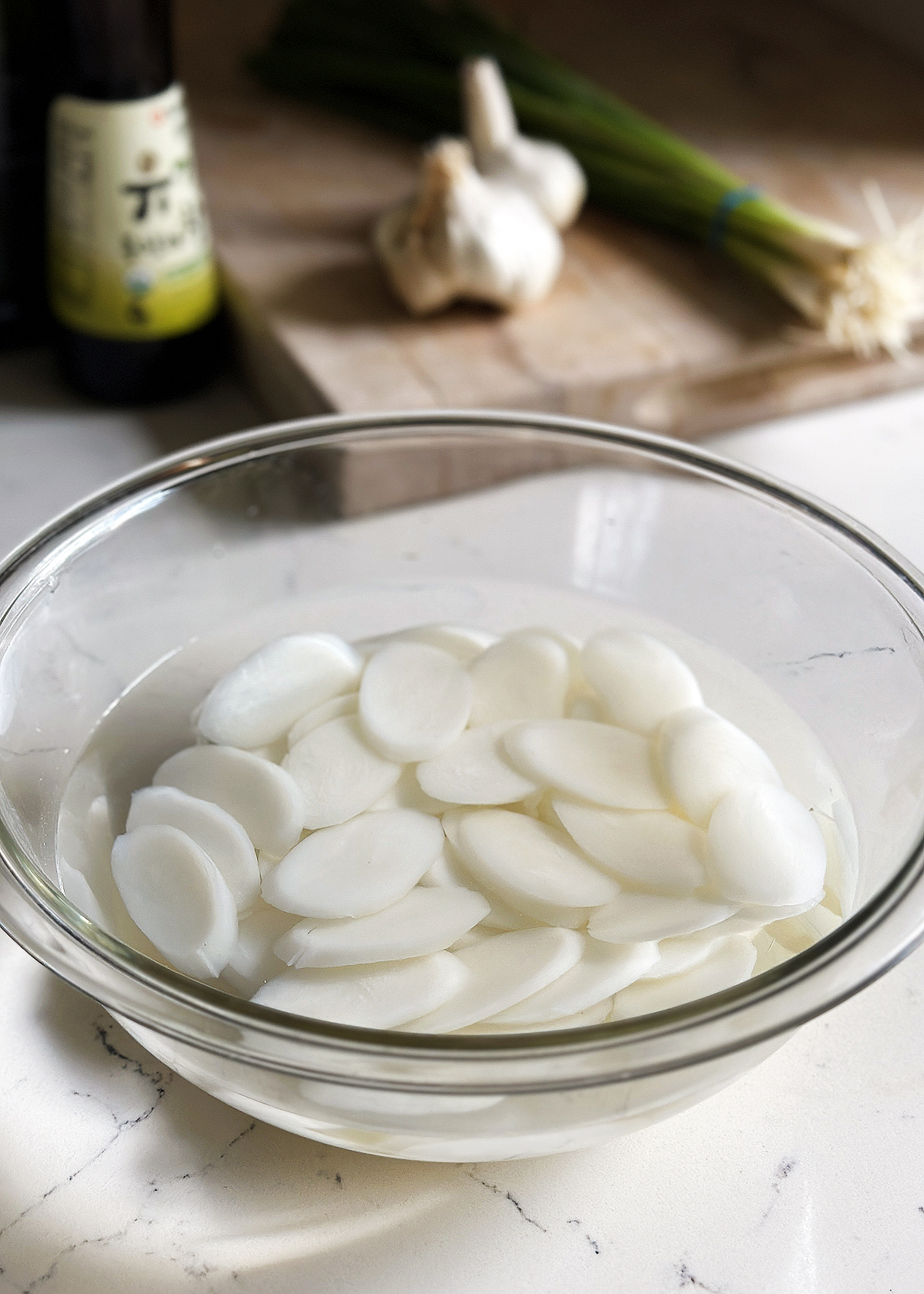
Soak Tteok: Soak tteok in cold water for at least 20 minutes, or until soft. If the tteok are frozen, it may take up to an hour.
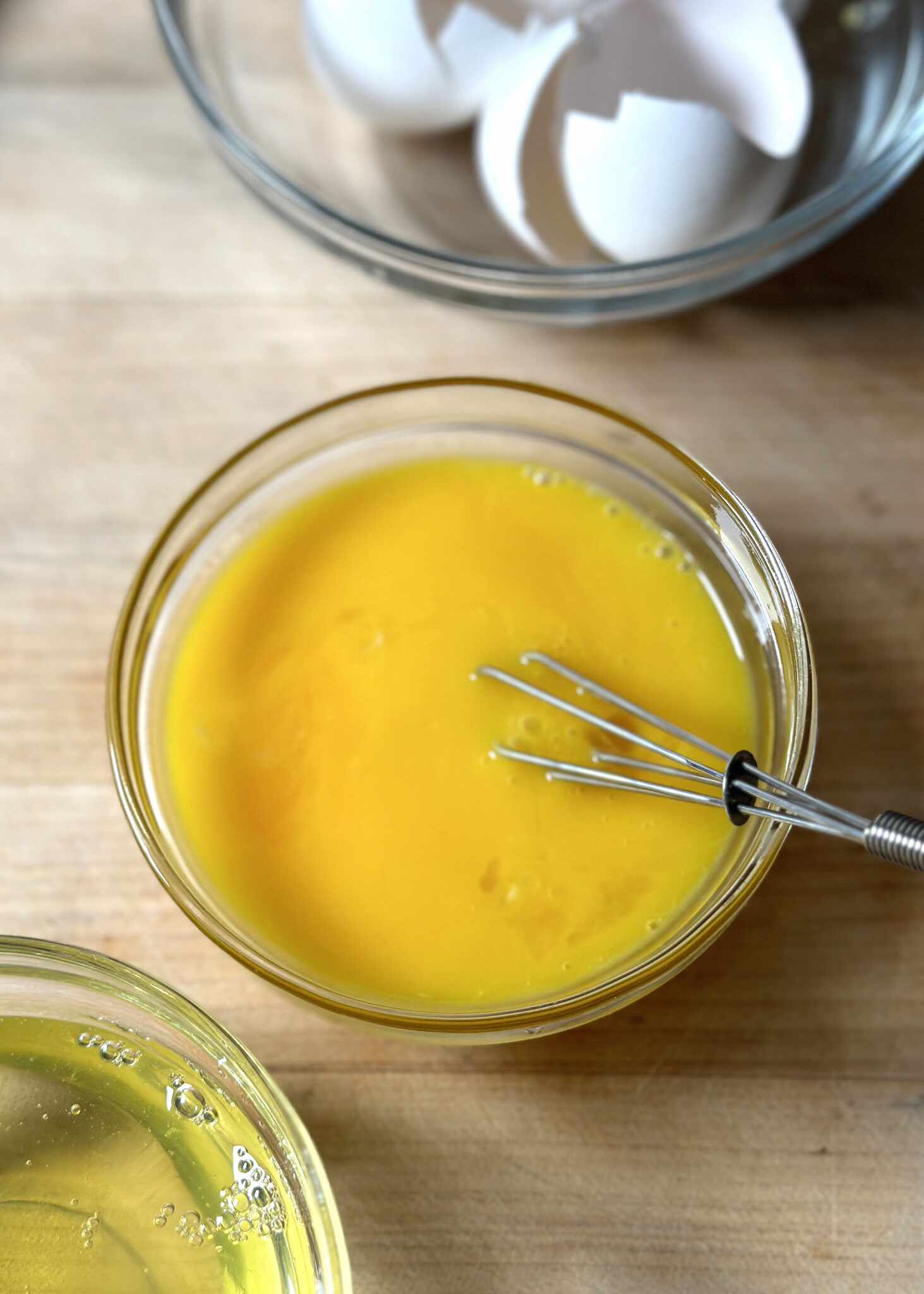
Make Egg Garnish while rice cakes soak: Lightly beat egg yolks until no streaks are visible.
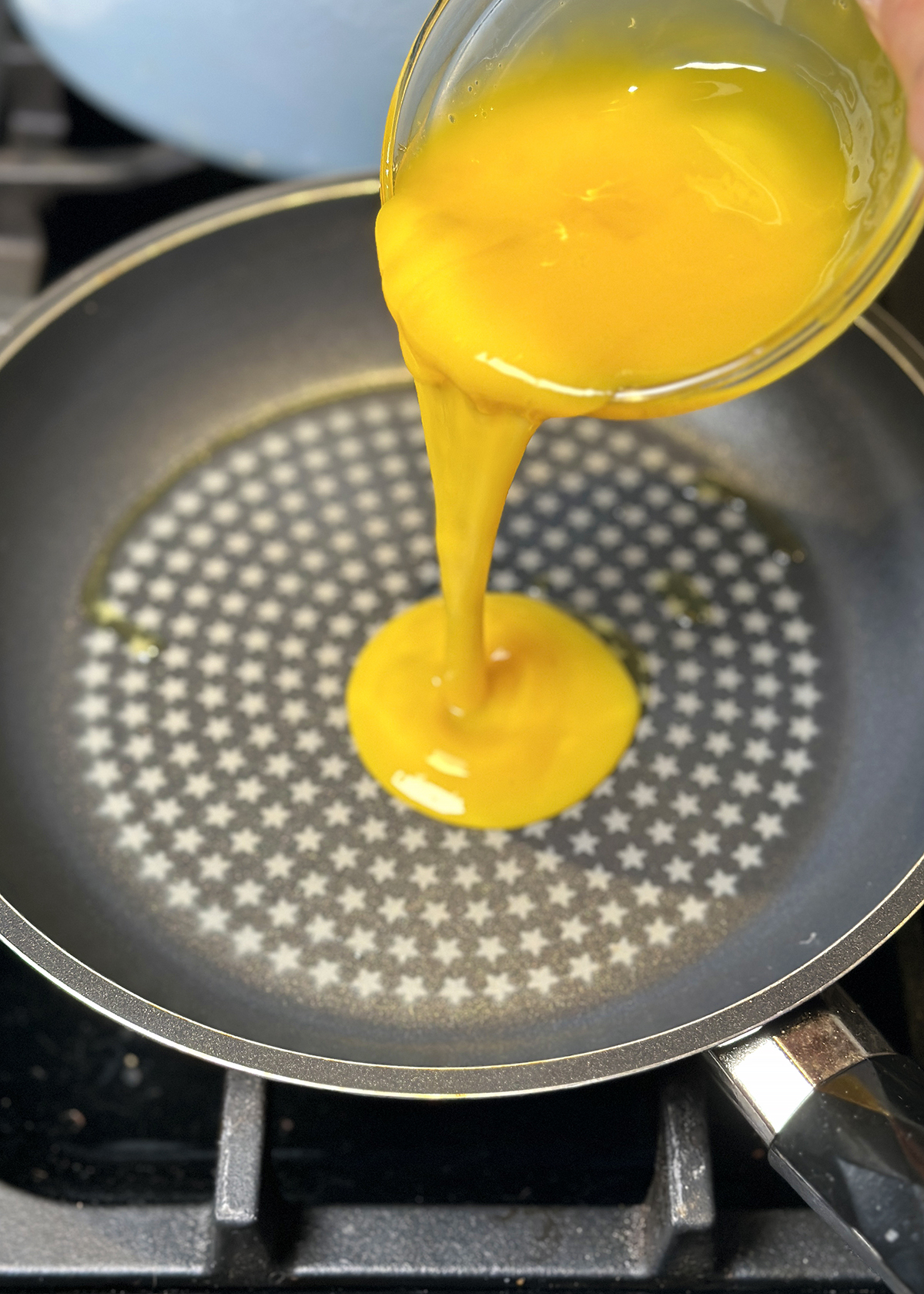
Heat neutral cooking oil in non-stick pan over medium heat. Pour beaten egg yolk into pan and swirl pan to spread out egg to the edges.
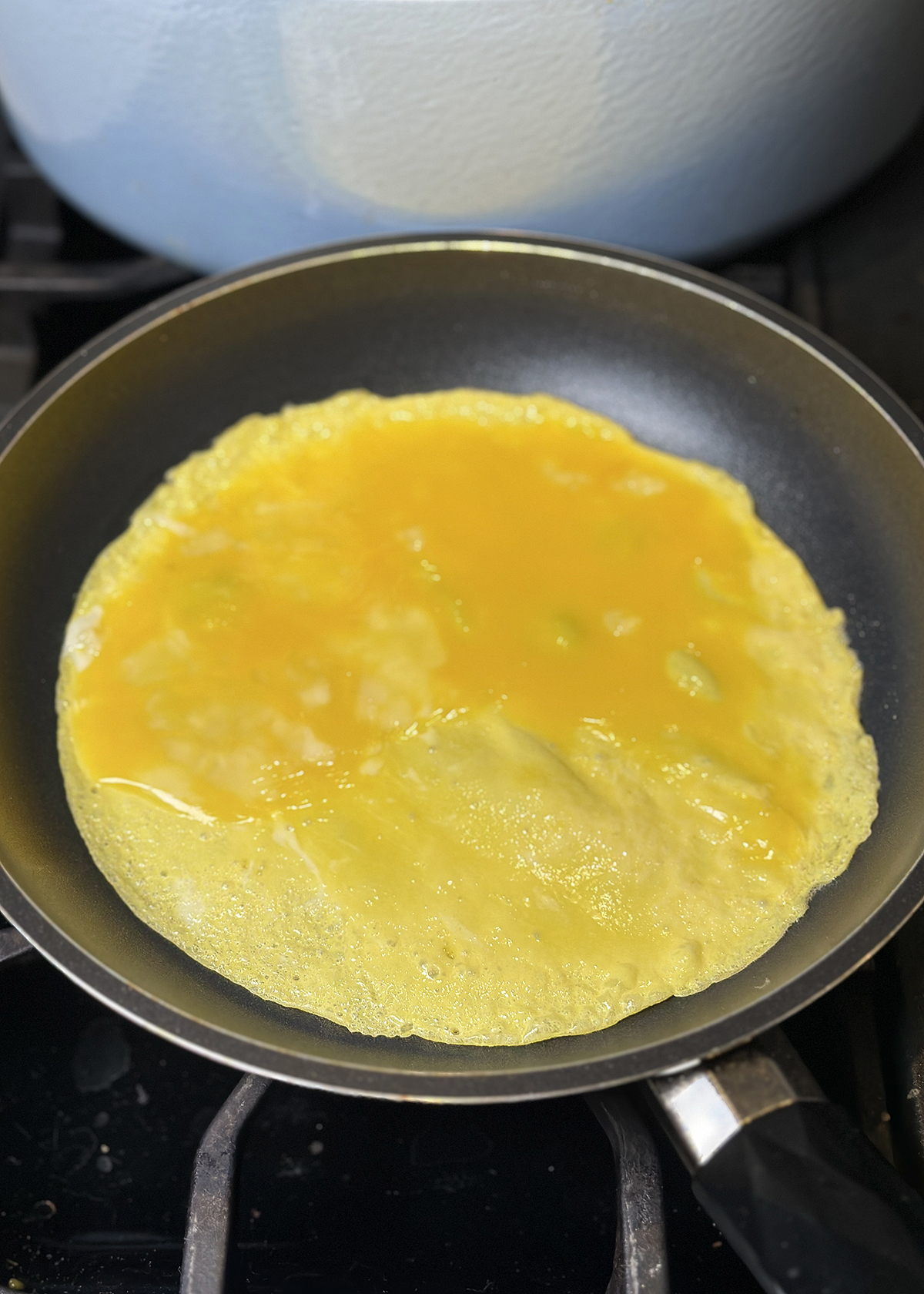
Cook egg until bottom is done and edges are starting to set, but not browned, about 1 minute. Turn off heat, flip egg to set the top side. Remove egg omelet to cutting board and slice into thin strips. Set aside.
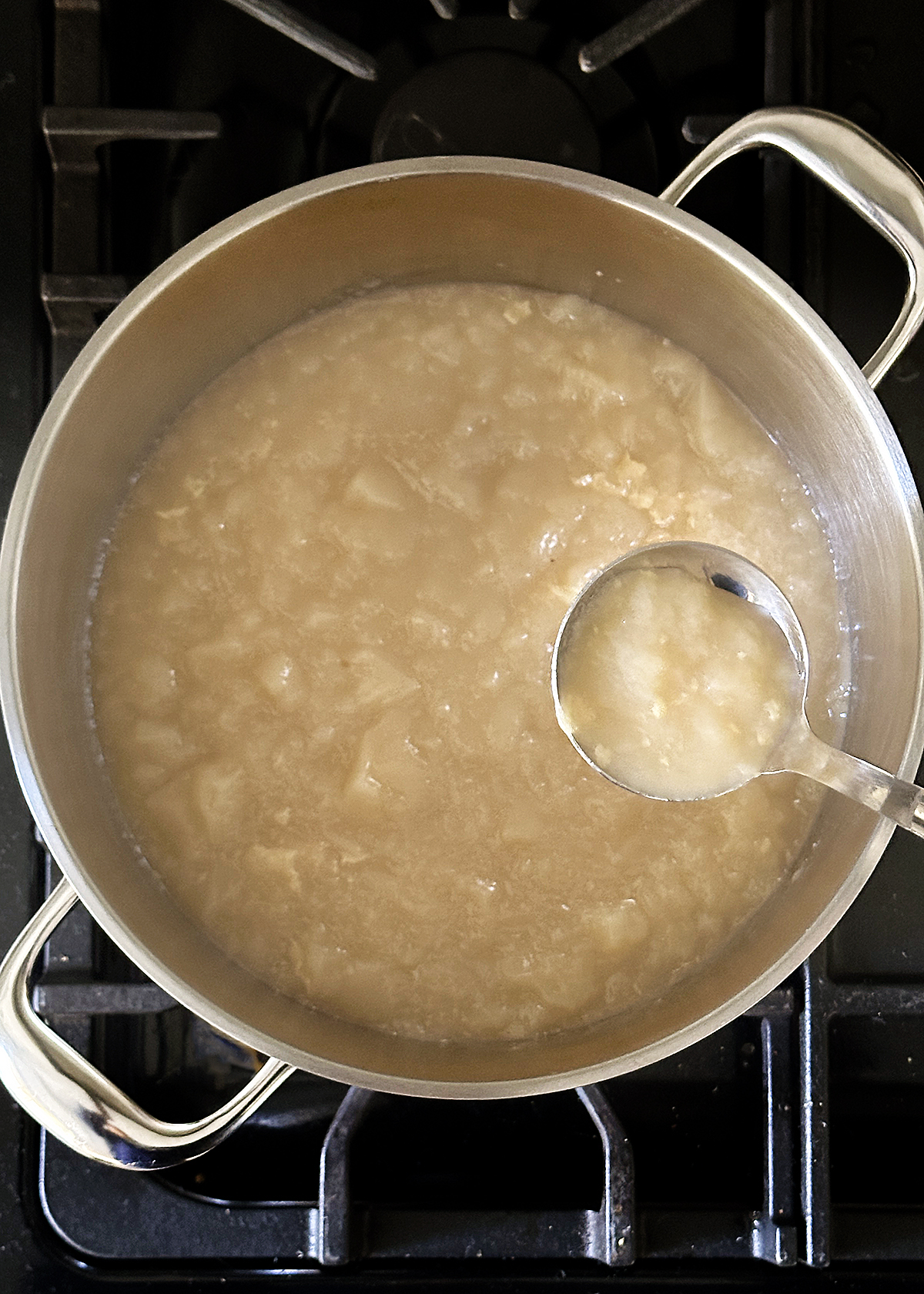
Make Soup Broth Base: Heat broth in large soup pot. This version is a homemade bone broth, which has a ton of minerals and nutrients—new year, might as well make it healthy!
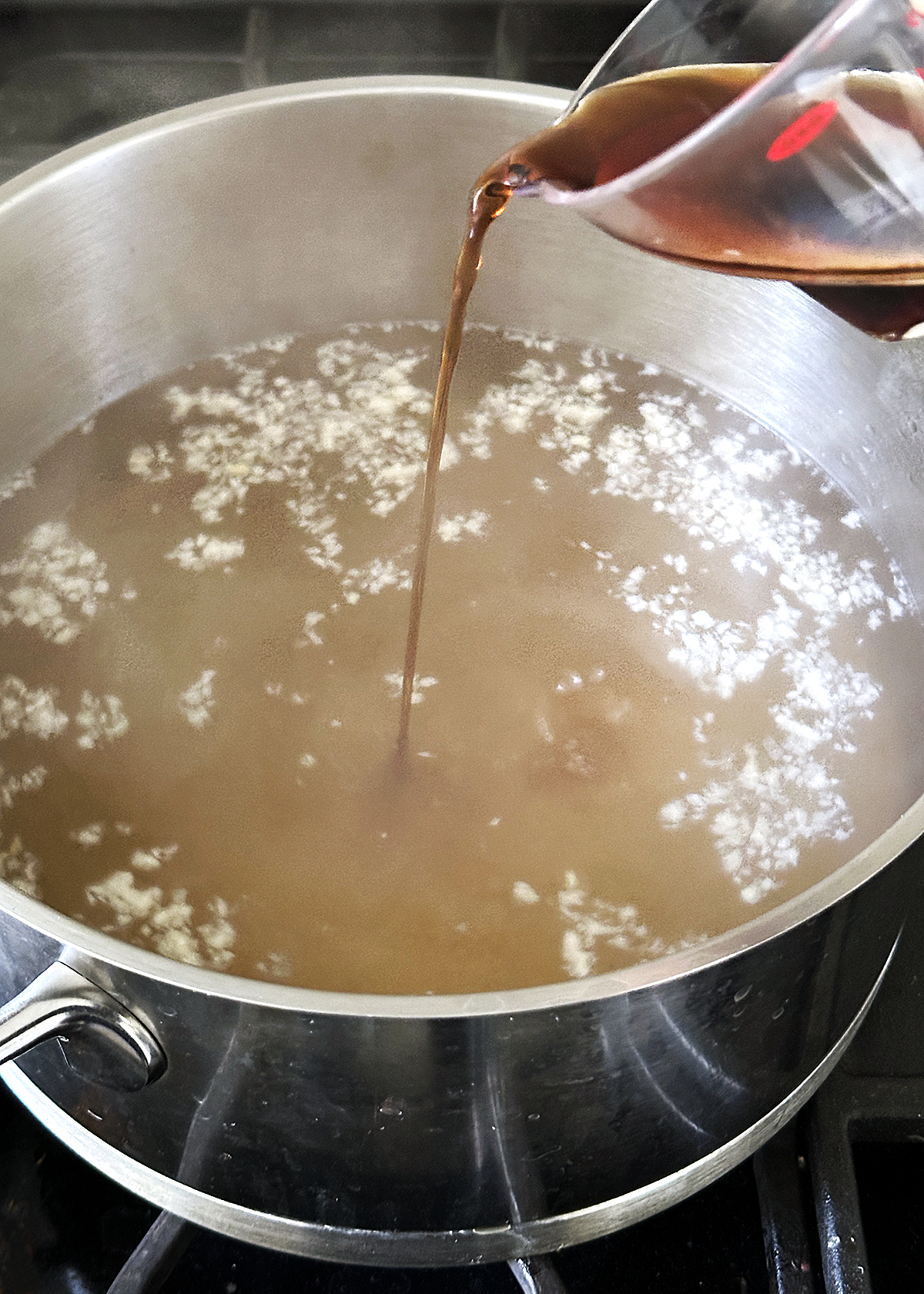
Season Soup Broth Base: Add garlic, soy sauce, and salt/pepper to taste, and let simmer for about 10 minutes to flavor the broth.
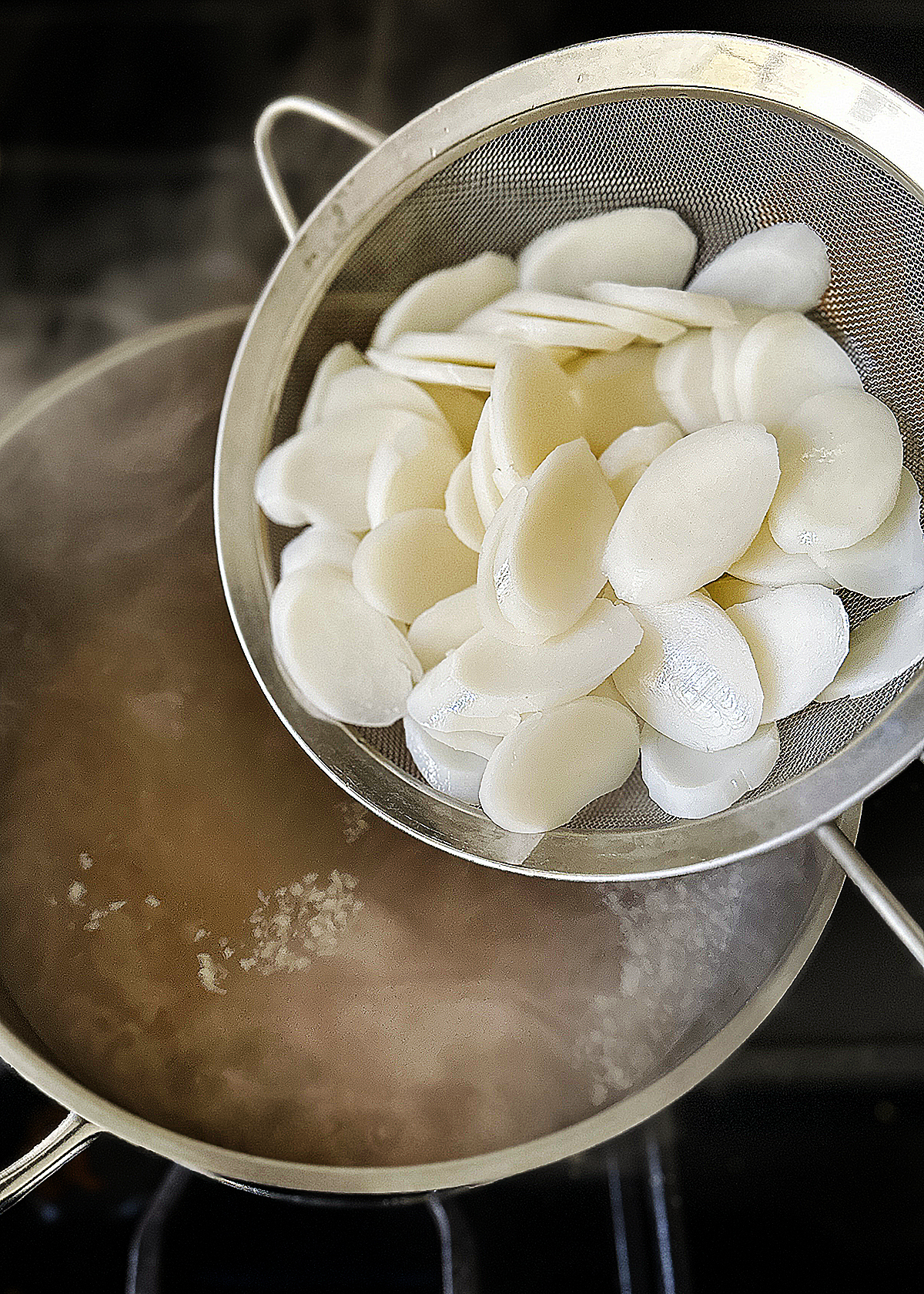
Add Tteok: Add tteok to broth. Bring to boil, then turn down heat and simmer until tteok floats to top and is soft, about 10 minutes.
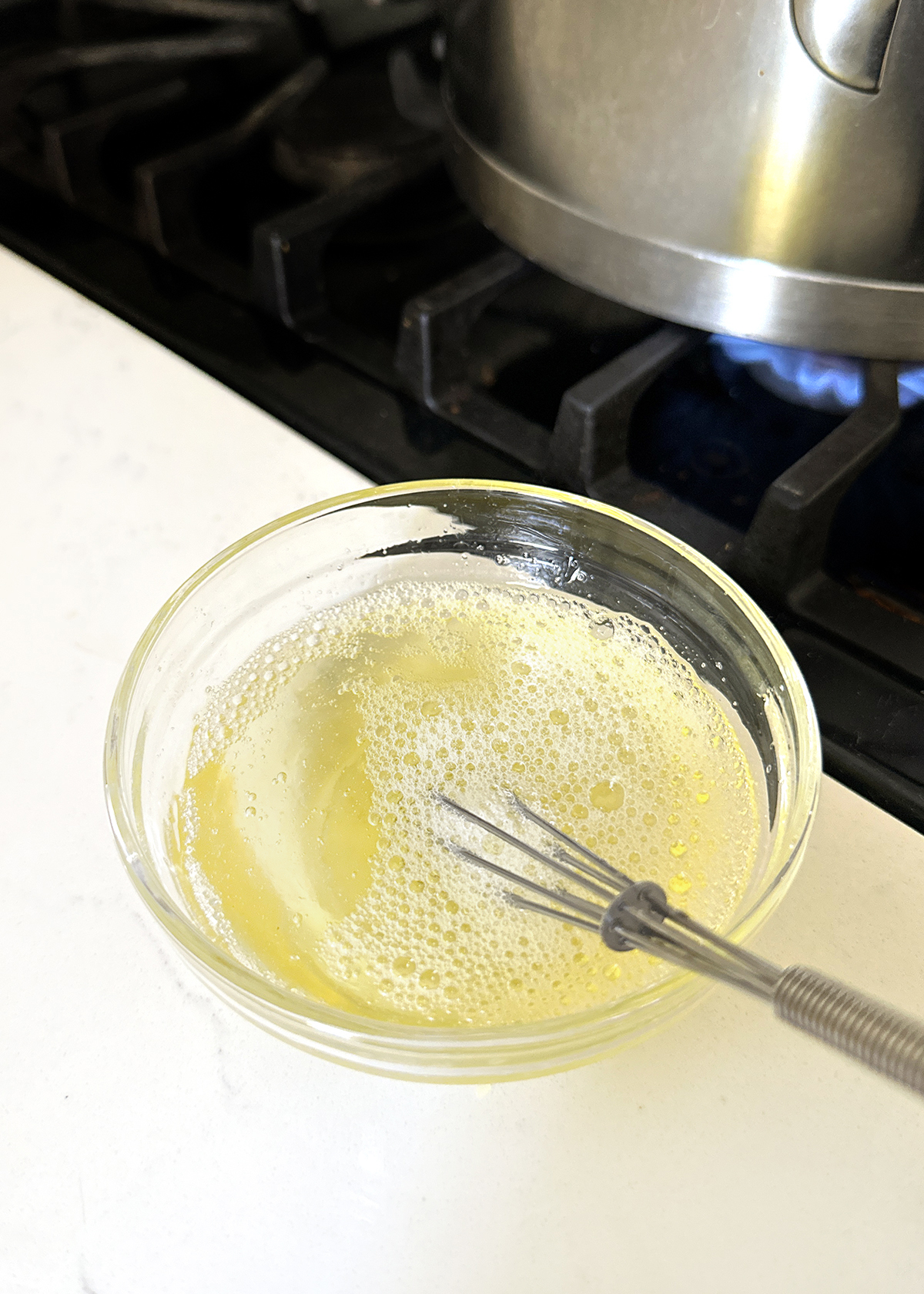
Add Egg Whites: Lightly beat egg whites.
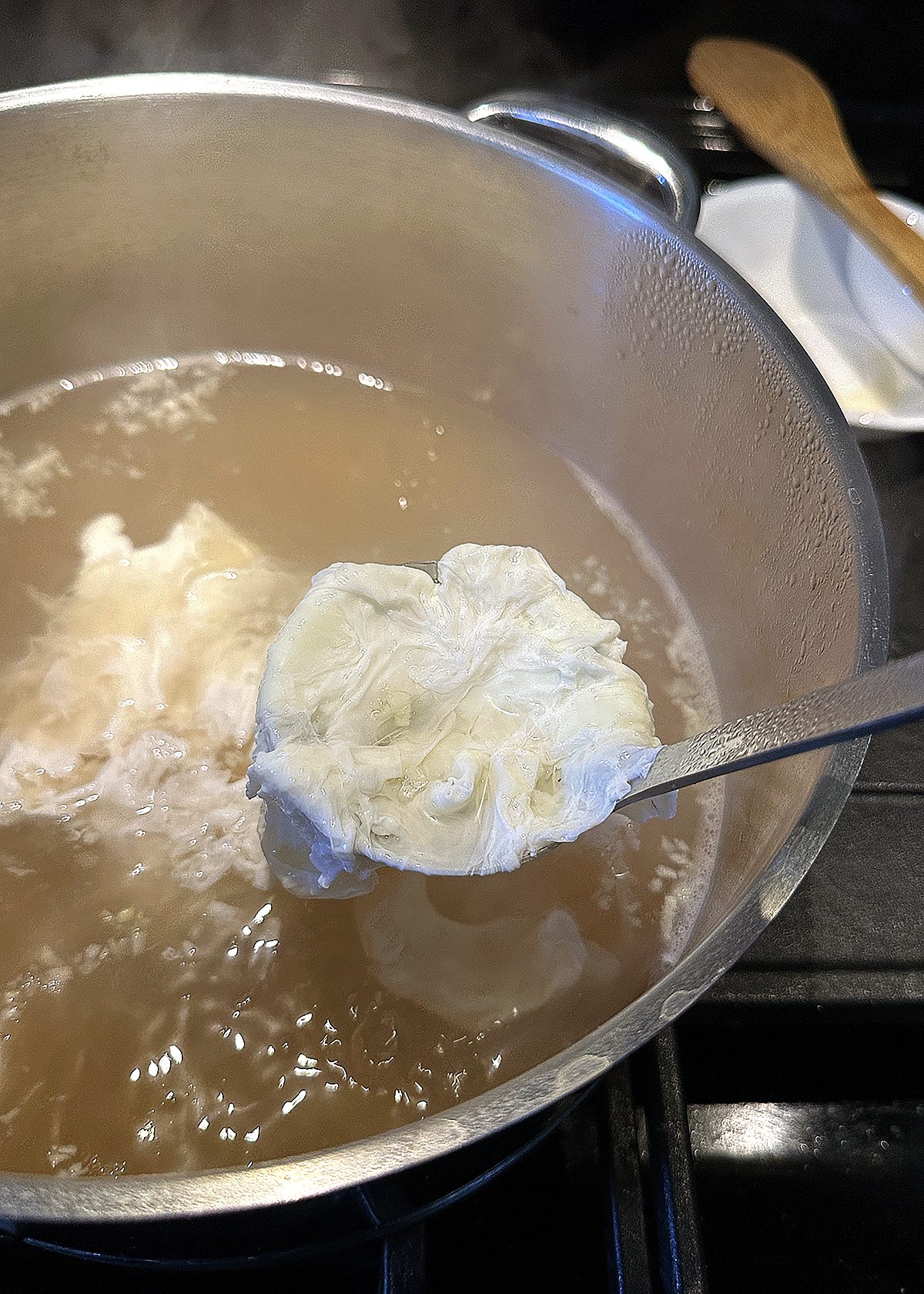
Then stir egg whites slowly into simmering soup to create wisps.

Assemble Bowls: Ladle tteokguk into individual serving bowls. Garnish with sliced egg garnish, sliced scallions, seaweed, and toasted sesame seeds.
Pro-tip #1: Garnish the bowls LITERALLY just before serving so the gim/nori/seaweed doesn't get totally soggy. It will anyway, but do your best!
Pro-tip #2: You can prepare each of the individual components of tteokguk in advance, and then just boil the tteok in the soup right before serving.
Ingredient Options and Substitutions
Here are a few suggested substitutions for the broth base as well as some of the slightly harder-to-find ingredients like Korean soup soy sauce.
Broth Substitution for Tteokguk. Personal taste preference will win out every time here, so I use homemade chicken bone broth for the potential health benefits like minerals, collagen, and protein.
Korean Soup Soy Sauce. This is a fairly specific ingredient that's used as a salt seasoning. It has a unique flavor, which is similar to regular soy sauce, but lighter in both flavor intensity and color. If you plan to make a few Korean recipes, it's worth seeking out a bottle. However, if you can't find it, substitute with half the regular soy sauce or tamari, and season to taste with sea salt at the end. Fish sauce is also a 1:1 substitute, but will impart an anchovy umami.
Dietary Substitutions
Vegetarian Tteokguk. To make this Tteokguk vegetarian, use a rich vegetable or mushroom broth as the soup base.
Vegan Tteokguk. To make a 100%-plant-based version of tteok suitable for vegans, use a rich vegetable or mushroom broth as the soup base, and use a plant-based egg substitute to make the garnish, or leave the egg out completely.
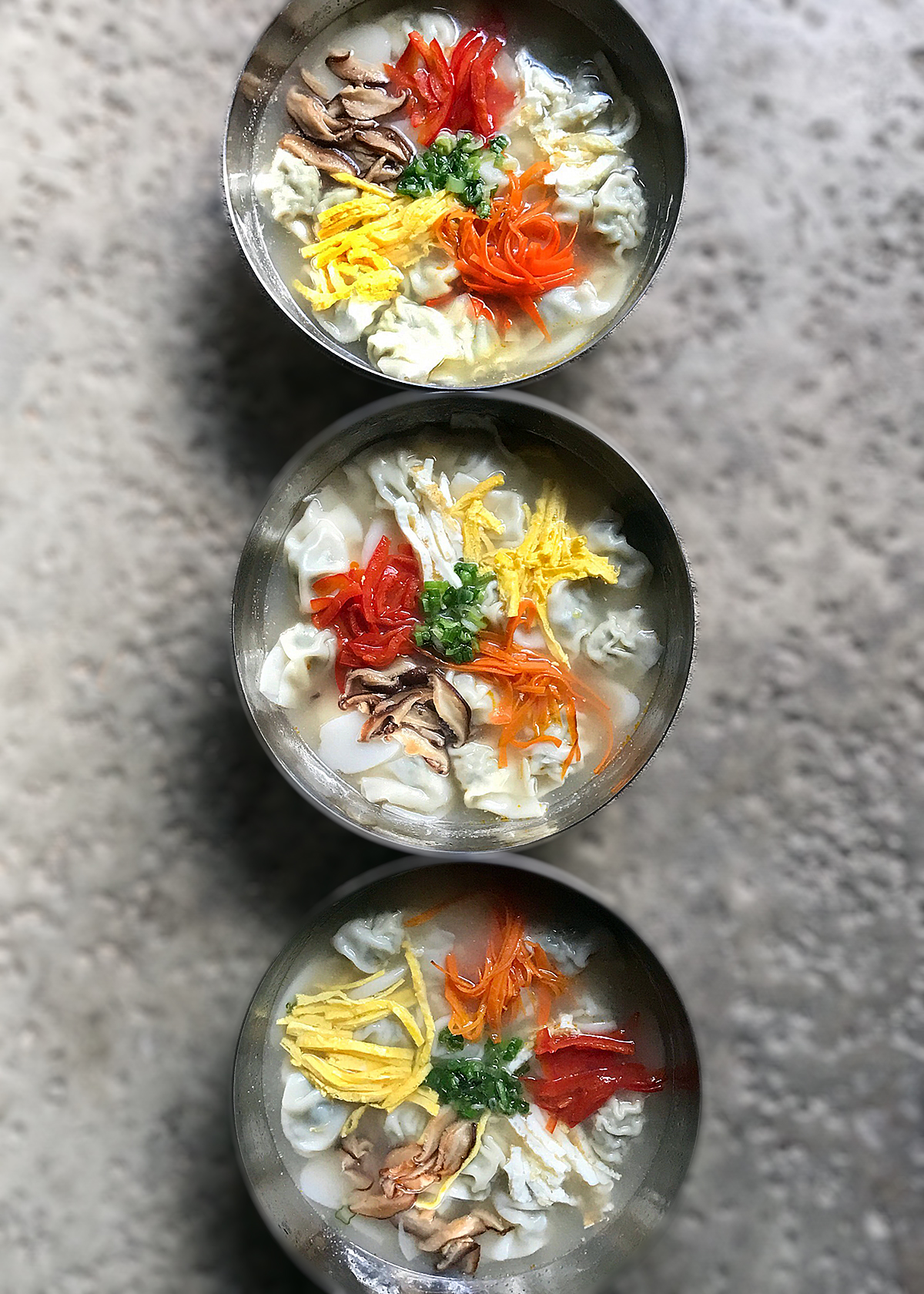
Tteokguk Variations
Tteok Mandoo Guk. This is the most common variation from the classic dduk guk. Korean dumplings (mandoo/mandu) are added to the soup with the rice cake. The photo above is a Tteok Mandu Guk variation with a lot of colorful vegetable garnishes that my Mom makes!
Pro Tips and Techniques for Tteokguk
- Use nutrient-dense, collagen rich bone broth. One of the key tenets of new year food is that it brings good health in the new year! Though tteokguk primarily symbolizes wealth and prosperity, why not make it something healthy as well? Use a rich bone broth that has lots of minerals and collagen.
- Prep garnishes in advance. If you're serving a lot of people on New Year's Day, prepare the garnishes a day in advance so they're all ready to go right before serving. Make the egg omelet and slice scallions and store in air-tight containers in the refrigerator. You can julienne the seaweed and store in an air-tight container or a ziploc bag with the air squeezed out.
- Cook only as many tteok as you can eat at once. Tteok breaks down in the broth much faster than say, pasta or ramen noodles in soup, so only cook as many as you will eat in one sitting.
- Keep broth hot on the stove after assembling bowls, so if you need more servings later, you can just add a few more slices of tteok to the broth and simmer for a few minutes.
Tools and Equipment
As I always say, you don't need any special equipment to make almost any recipe. However, that's not to say there are a couple of gadgets and tools that might make it a LOT easier to get Tteokguk from your pantry to plate—.
- Mini ¼-cup liquid measuring cup
- Glass mixing bowls for making marinade
- Mini whisk
- Glass storage container with airtight lids, perfect size for storing Bibimbap Sauce, and even transferring your gochujang out of the plastic container from the store into glass!
Advance Prep, Leftovers, and Storage
The broth base for Tteokguk can be cooked in advance. The individual garnishes can be prepped 1 day in advance and kept in air-tight containers in the refrigerator.
Once the tteok has been simmered in the broth, leftovers do not store well. So cook only as much tteok as you can eat.
What Else to Serve with Tteokguk
A generous bowl of tteok guk adorned with all the colorful garnishes is meant to be an entire meal itself! A Korean table almost always has kimchi to go with the meal, but you can serve a few other banchan (side dishes) like:
- Oi Muchim, Korean Spicy Cucumbers
- Korean Sesame Spinach
- Spicy Cucumber Salad, Din Tai Fung dim sum dupe
- Spicy Cucumber Avocado Salad with Chili Garlic Vinaigrette
Traditional New Year Dishes
These are the best celebratory dishes to serve on New Year and Lunar New Year:
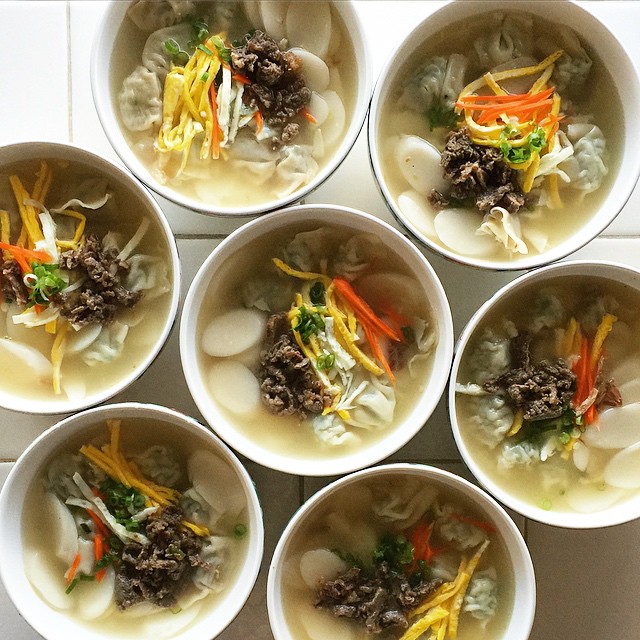
Tteokguk, Dduk Guk | Korean Rice Cake Soup Recipe
Ingredients
- 1 16 ounce package tteok oval slices
- 8 cups rich broth or stock any kind: anchovy, chicken, beef, or vegetable
- 10 cloves garlic finely minced
- 2 tablespoons Korean soup soy sauce
- 4 eggs yolks and white separated
- 1 tablespoon avocado oil for cooking egg yolks
- 2-3 scallions sliced on the bias
- toasted nori seaweed, or nori, julienned/crumbled for garnish
- optional garnish: sesame oil, red pepper, toasted sesame seeds
Instructions
- Soak tteok in cold water for at least 20 minutes, or until soft.
- While rice cakes soak, heat broth in large soup pot. Add garlic, soy sauce, and salt/pepper to taste, and let simmer for about 10 minutes to flavor the broth.
- Add dduk. Allow to simmer until dduk is soft, about 10 minutes.
- Lightly beat egg whites, then stir slowly into simmering soup to create wisps.
Cook Egg Omelet Garnish
- Lightly beat egg yolks until no streaks are visible. Heat a tablespoon of avocado oil in a 10-inch non-stick pan over medium heat. Pour eggs into pan and let cook without browning about 3 minutes—you may have to turn heat down to medium-low. Turn omelet over in one piece, finish cooking, about 30 seconds.
- Remove egg omelet to cutting board and slice into thin strips. Set aside.
Serve Dduk Gook Soup
- To serve, ladle broth into bowls and distribute rice cakes equally among bowls. Drizzle each bowl with about 1 teaspoon sesame oil. Garnish with egg garnish, sliced green onions, toasted nori and optional red pepper and toasted sesame seeds if using.
Notes
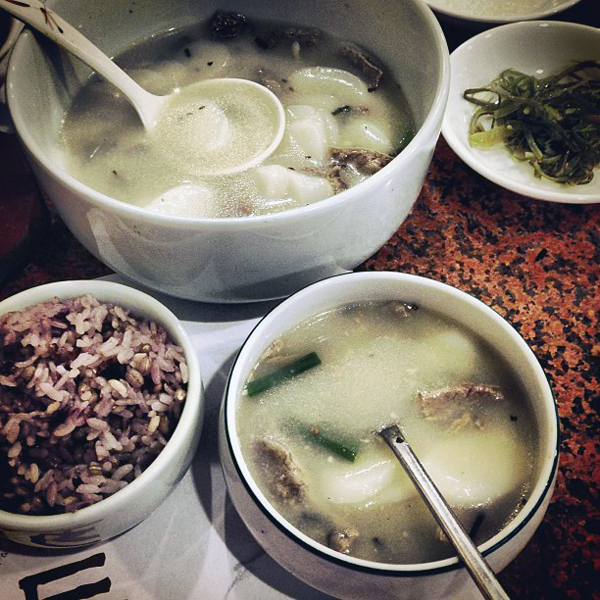
Tteokguk in Korean Restaurants
Tteok guk is very traditional Korean dish, and though it was typically served only on New Year's Day, you can actually find tteok guk on Korean restaurant menus available all the time. Here are some of the best:
- Seong Buk Dong, a hole-in-the-wall traditional Korean restaurant that serves homestyle classics. I've tried their tteok guk made with beef, pictured above, and loved it!
- Sun Nong Dan, classic and modern Korean food, most known for their cheese-blanketed Spicy Galbi Jjim, they also have tteok guk. Bonus: the restaurant is open 24 hours!
- Ma Dang Gook Soo, a noodle and dumpling specialist, they have a large offering of soups, including tteok guk.
- MDK Noodles, a noodle specialist, but they also have tteok guk. Their version of tteok guk is chicken based, in chicken stock and topped with chicken.
Afterthoughts
There are a lot of traditions associated with the coming of the new year, whether it’s the Western New Year that we ring in on January 1, the Lunar New Year which lands some time in late January or early February, Rosh Hashanah, the Jewish new year, in September or October. I’m American, and ring in the new year at midnight on December 31 with lots of Champagne and pretty much all kinds of other decadent debauchery.
Han-boks and Seh-beh
But my family adheres to some of the Korean traditions associated with the new year. When we were little, my sisters and I would very begrudgingly don our hahn-boks, traditional Korean dresses, and do seh-beh.
I fucking hated it.
The dresses were stiff and itchy and very uncomfortable. After a while, they got too small, but a hahn-bok isn’t something you can pick up in the next size up at the mall. They are always custom-made in Korea, and Mom brought them back only when she went to visit Korea.
My parents sat on the couch, and each of us in turn would pay our respects by kneeling down and taking a deep bow – so deep, our foreheads touched the floor at my parents’ feet. "Seh-hae-bohk mah-nee bah-duh-sae-yuh” is the wish for prosperity and good fortune. America puts very little emphasis on ceremony and tradition, so I thought all of this was ridiculous.
Of course, I tolerated it, since part of the tradition is exchanging gifts, and as a child, I received seh-beh dohn – money. After we bowed, my mom pulled a little roll of cash out of her sleeve and handed it to each of us. I would just snatch it from her, run to my room to change out of the horrible hahn-bohk and stash my cash away. Greedy spoiled little brat. Then we’d eat the traditional Korean new year food, dduk-gook, a brothy soup (gook) with small rice cakes (dduk).
Dduk, Dduk, Gook
Why dduk-gook is important for the new year, not even my mom knows for sure. I just know that we’ve always eaten it. With almost everything available pre-marinated, pre-made, or pre-cooked at the Korean market, Mom doesn’t have to cook anything these days. And though dduk gook isn’t as complicated as other Korean dishes, she always spends time making the dduk gook at home.
This year, I missed the traditional seh-beh on Day 1. I was off whirling around downtown LA with a 72 hour hazy buzz. But my Mom still called me, asked me to be careful, not to drink too much, and said that even if I’d be a day late, my dduk gook was waiting for me. And my seh-beh dohn, too. Honestly, the seh-beh dohn is really a tradition for children, but I guess to Mom, I’m always a child. I'm still a little hungover, and maybe that's why we serve dduk gook on New Year's Day - to cure a wicked hangover.
As much as I hated it back then, I so appreciate my parents’ teaching me as much as they could about my heritage, despite all my reluctant rebellion. We still do seh-beh now, but we don’t have to dress up. And as much as I still feel a little silly with my forehead pressed to the floor, I know how much it means to my parents that I wish them a prosperous new year in Korean. It means a lot to me, too.


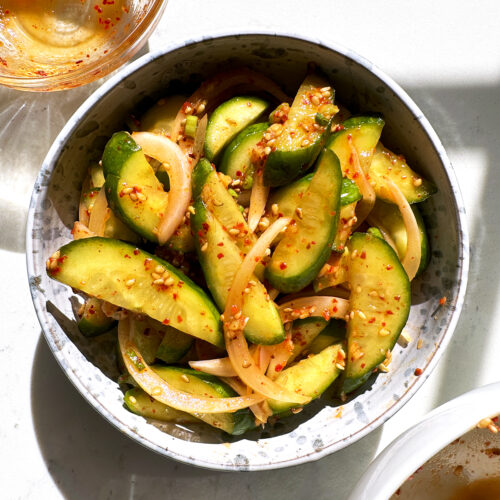
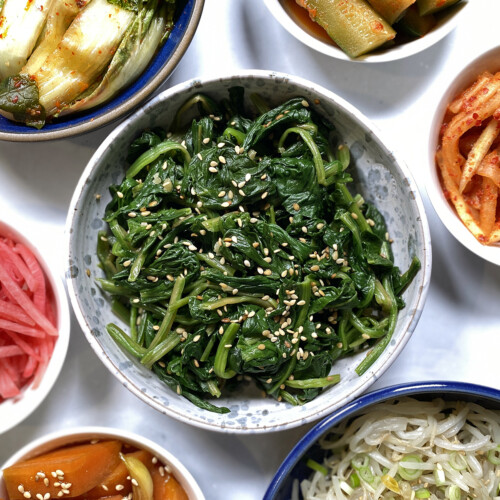
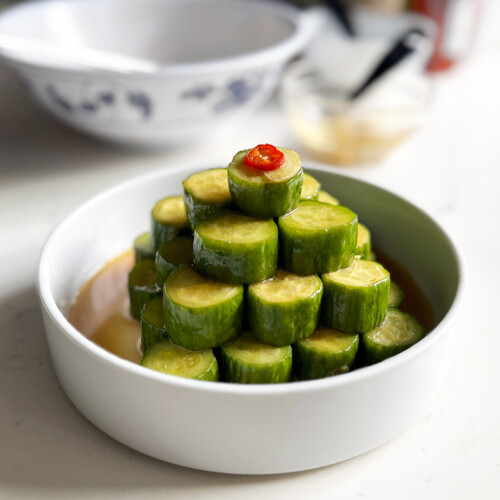
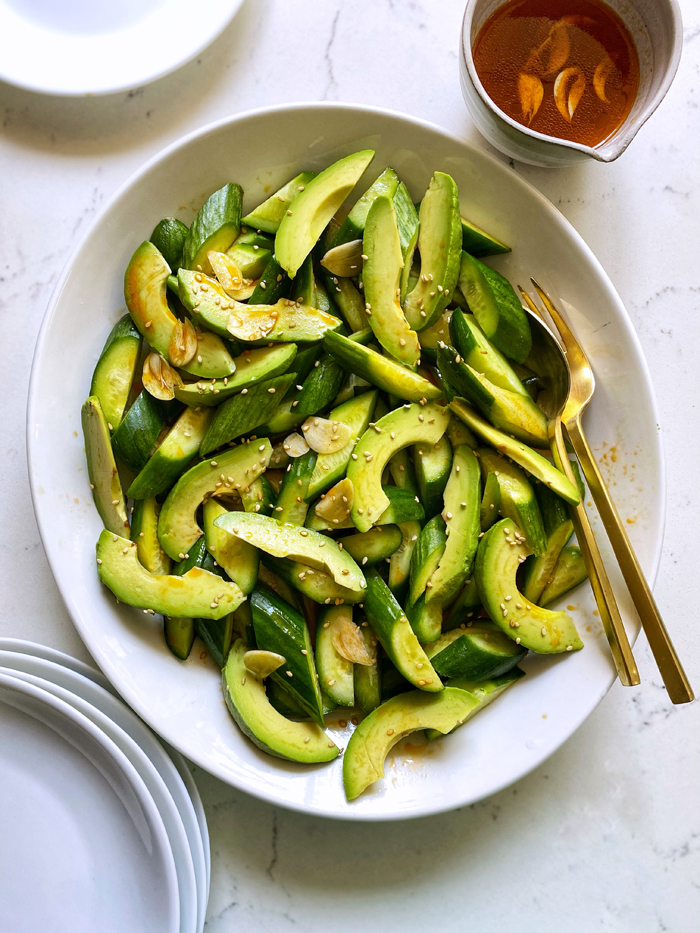
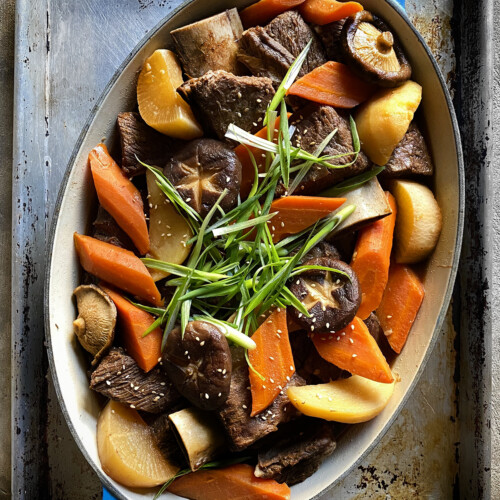
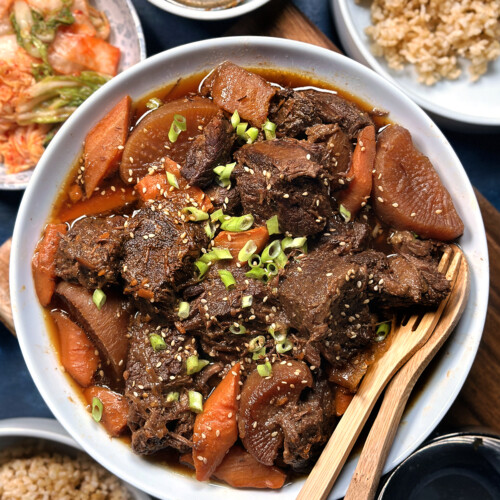
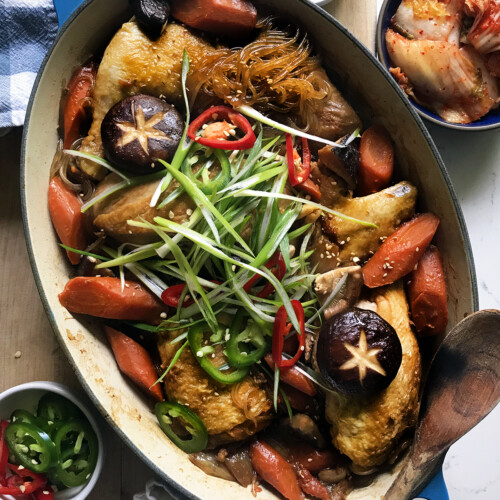
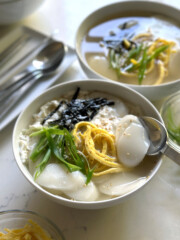

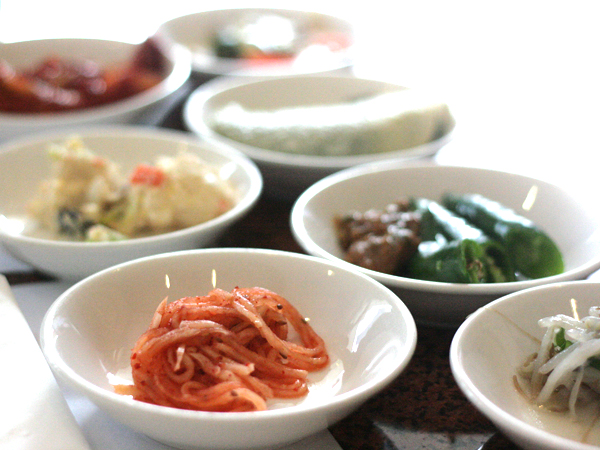
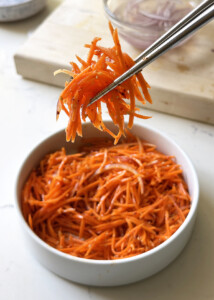
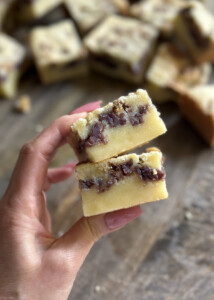
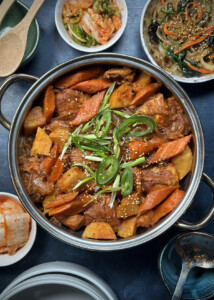
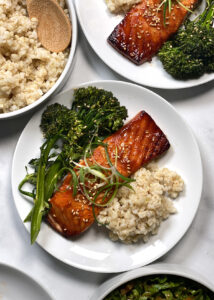
Anonymous says
Yayyy!!!
Finally, a nice, simple, tasty recipe for dduk mandu gook! It might even be better than my mom's!
sarah says
well, come on now...nothing is EVER better than your own mom's ;)
Anonymous says
sorry to point this out, because I like your writing, but it's *han* bok, not hahm bok
Anonymous says
How cool! I'm wondering if its okay to cook it without the mandu to just make duk gook.
Anonymous says
What a wonderful writing on the obedient reluctance experienced by 2nd generation Americans whose parents are from cultures different than ours. It brought tears to my eyes. My hat is off to you for not only surviving your young years by appreciating them and what your parents cultural beliefs brought to you. Happy New Year!
Sean says
I was intrigued to see what your first post would be like after seeing your Five Candles post. It's funny/interesting to look back and see how far (and man you've come a long way!) we've come and changed from our first to latest post.
I'm not sure how much time you spent on this post but it's beautifully written and I can totally relate to this.
Keep up the great work and looking forward to more of your stuff! Oh, and your twitter updates are pretty cool/funny too.
Sarah J. Gim says
Sean: A lot has changed. I guess the biggest thing being…I actually wrote about food! LOL. I write about food now, but soooo differently. Glad to see new people join the food blog world every day, including you!
Diana says
How am I not at all surprised that the first sentence of your very first blog post included the word "cock?"
Chingoo says
I'm confused. Why are all of your Korean words misspelled? Why are you putting ham in a hanbok?
- your chingoo
Cardea Concrete says
I love the recipe! My mum loves it!